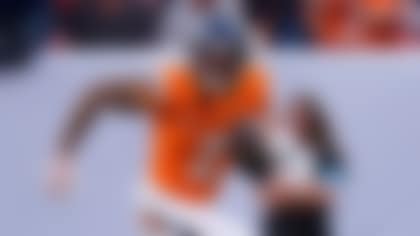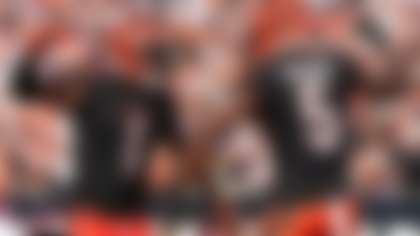Defensive backs who serve as human blankets are more coveted than ever.
Thanks to the pro game's rapid shift to pass-first offenses and rules that increasingly protect both quarterbacks and pass catchers, the value of the hard-hitting DB has decreased while the stock for premier cover guys has soared.
Are we in the beginning of the golden era of coverage? That's debatable, but defenders have to balance making stops and avoiding getting too physical now more than ever, further emphasizing the importance of details and technique. In some ways, forcing tight windows and recording passes defensed are the new jarring hits.
Now, some of the most important notes about this piece: It's a little different from the others in this series because we aren't going to rely on one metric above the rest to determine who makes the list. We're going to find our top 10 based on a combination of key metrics because some relevant stats (catch rate below expectation, for example) skew in favor of safeties as opposed to corners due to their location on the field and distance they must cover. Not all of these defenders are operating on the same plane.
The key criteria in filtering candidates: A minimum of 300 coverage snaps and a minimum of 40 targets (for ample volume). Why require at least 40 targets? Well, while there is a bit of skew in favor of safeties in some categories, a 50-target minimum eliminated too many safeties for this to be a fair reflection of their ability in coverage, at least in my opinion.
The key metrics that will be considered in judging this group:
- Passer rating allowed
- Catch rate allowed below expectation
- Tight window percentage
- Target rate
- Average separation yards
Ballhawk rate and coverage-success rate will also be considered as supplemental metrics.
I know that's a lot to digest. Deep breaths, everyone. Let's dive into the top 10.
Passer rating allowed: 38. Catch rate allowed below expectation: -11.8. Tight window pct: 27.1. Target rate: 19.5. Average separation yards: 2.7.
Gilmore cemented himself as the league's best corner in 2019 with numbers like the ones listed above, which don't even include his six interceptions. He was the only player who faced 85 or more targets and didn't give up a touchdown. He allowed the lowest passer rating as the nearest defender in coverage among cornerbacks in 2019 (teammate J.C. Jackson is listed as a defensive back). His catch rate allowed below expectation (-11.8) was also the lowest among cornerbacks with a minimum of 300 coverage snaps. No one was better in coverage than Gilmore in 2019.
Passer rating allowed: 21.8. Catch rate allowed below expectation: -10.1. Tight window pct: 27.6. Target rate: 15.6. Average separation yards: 2.2.
Jackson's numbers are slightly better than Gilmore's, but we need to consider a key stat here: targets. Gilmore posted a similarly excellent percentage in coverage, but did so on almost twice as many targets (96 versus Jackson's 58). Add in the fact that they play on the same team, with Gilmore serving as the No. 1 corner often tasked with the more difficult assignment, and Gilmore's performance looks slightly better. Having said that, Jackson was still a revelation for the Patriots despite starting just six games, allowing the lowest passer rating as the nearest defender in coverage among all defenders who qualified for this exercise, and the second-lowest completion percentage allowed. Jackson was excellent, especially in press coverage, allowing a passer rating of just 8.1 in such situations and recording all five of his interceptions while in press. No one was better in those two categories while in press. Add in his perfect passer rating allowed of 0.0 as the nearest defender on deep targets and you'll see the resume of a defensive back poised to explode onto the scene as a soon-to-be-household name in the same defense that also features Gilmore, the reigning NFL Defensive Player of the Year.
Passer rating allowed: 34.7. Catch rate allowed below expectation: -6.7. Tight window pct: 34.1. Target rate: 8.6. Average separation yards: 2.9.
Simmons didn't face nearly as many targets as someone like Gilmore (Gilmore: 96; Simmons: 44), but he was incredibly effective when he was the nearest defender on a target. Simmons' ballhawk rate -- the percentage of targets where the nearest defender made a play on the football (pass defensed or interception) -- was 34.1 percent, the best among those meeting this established criteria by more than six percentage points. His 44 targets sneak him into the pool of players considered for this list, and while his catch rate allowed below expectation wasn't as impressive (-6.7 percent), his tight-window percentage of 34.1 helps us understand just how Simmons allowed such a low opposing passer rating. Simmons is a stud with a bright future, and if there were still some folks out there who weren't aware of his performance, these numbers should help open their eyes.
Passer rating allowed: 38.9. Catch rate allowed below expectation: -8.4. Tight window pct: 28.6. Target rate: 17.3. Average separation yards: 2.1.
White has blossomed into the No. 1 corner Buffalo hoped it was getting when it made him a first-round pick out of LSU in 2017. White faced 84 targets in 2019 and consistently refused to allow defenses to succeed when throwing in his direction, as evidenced by his six interceptions, 17 passes defensed, passer rating allowed (38.9) and catch rate allowed below expectation (-8.4 percent). White forced a tight window at a higher rate than the two Patriots above him on this list even though he played press coverage at a much lower rate. He stashes himself in a receiver's hip pocket and refuses to leave it, and his ballhawk rate (20.2 percent) is close to that of Gilmore, the No. 1 player on this list. Enough said.
Passer rating allowed: 49.9. Catch rate allowed below expectation: -20.9. Tight window pct: 16.3. Target rate: 8.1. Average separation yards: 2.9.
Jackson doesn't get targeted all that much (43 times in 2019) and his ballhawk rate (9.3 percent) doesn't jump off the screen, but quarterbacks are consistently frustrated by his coverage. Look no further than Jackson's passer rating allowed of just 49.9 and his catch rate allowed below expectation of -20.9 percent. That's by far the best mark of any player on this list, and while a lower total of targets has something to do with it, it's still very impressive. The only number that is surprisingly low is Jackson's interception total (one), as he's demonstrated a nose for the ball in years past. His overall coverage resume is tough to argue with, though.
Passer rating allowed: 50.3. Catch rate allowed below expectation: -8.2. Tight window pct: 20. Target rate: 8.4. Average separation yards: 2.9.
I initially had Smith a little lower on this list, but when compared with Seahawks safety Bradley McDougald (No. 8 on this list), Smith comes out as the winner even with 10 fewer targets than McDougald (McDougald: 50; Smith: 40). The factors in Smith's favor were his frequency of tight windows forced and the lower passer rating allowed. Now, it's a little easier to post these numbers as a safety than a cornerback, of course, but that shouldn't diminish how Smith's production is viewed. Anthony Harris might also want to thank Smith for his contributions to the safety's standout 2019 campaign (he made my list of Pro Bowls snubs), which couldn't have happened without Smith's enduring presence as the more feared safety on Minnesota's defense.
Passer rating allowed: 68. Catch rate allowed below expectation: -8.9. Tight window pct: 28.6. Target rate: 22.4. Average separation yards: 2.6.
Ward lands here in large part due to the numbers he produced while facing the highest target rate among this group. There's also his coverage success rate of 61 percent and his ballhawk rate of 14.3 percent, which are impressive on their own, but also come with Ward's tight window rate of 28.6 percent. He's blanketing receivers and doing so consistently, with his 77 targets accounting for nearly a quarter of his coverage snaps. Teams seldom enjoyed success when they threw at Ward. His 2020 season should be even better, provided he can get through it healthier than his injury plagued 2019 campaign.
Passer rating allowed: 54.4. Catch rate allowed below expectation: -9.8. Tight window pct: 12. Target rate: 10.2. Average separation yards: 2.9.
McDougald is somewhat of a late bloomer and it might surprise some people to see him on this list, but his numbers don't lie. They're very comparable to that of Harrison Smith (as I mentioned above), and though he doesn't pack the same punch in terms of name recognition, he brings it on the field. His coverage success rate (62 percent) really stands out. Only three other players on this list had better success rates than McDougald: Justin Simmons (65.9 percent), J.C. Jackson (65.5) and Eddie Jackson (62.8). The rest of the numbers speak for themselves and help explain why the safety tandem of McDougald and Quandre Diggs should have Seahawks fans excited about 2020.
Passer rating allowed: 57.6. Catch rate allowed below expectation: -7.5. Tight window pct: 17.1. Target rate: 14. Average separation yards: 3.4.
Mathieu might have landed a bit higher on this list if his catch rate allowed was a little better, but his average separation helps explain why it wasn't quite as impressive as some others featured in this post. Look to Mathieu's ballhawk rate of 17.1 percent for an indication of his effectiveness beyond his passer rating allowed and his four interceptions. As a roving safety, Mathieu made a difference and did so without some traditional circumstances (alignment, for example) helping boost his numbers. Ask any Chief from the 2019 season, and I'm sure he'll rave about Mathieu's contributions to their Super Bowl run. He helped lift Kansas City to the throne.
Passer rating allowed: 58.6. Catch rate allowed below expectation: -3.9. Tight window pct: 27.5. Target rate: 15.6. Average separation yards: 4.7.
Leonard's numbers look a bit different than those of the other players featured here because he's covering from a linebacker spot, not as a defensive back on the perimeter or in the slot. Leonard's task is arguably more difficult, as he's expected to consistently stop the run and also cover all types of targets -- receivers, running backs and tight ends -- while carrying a larger body around the field.
Having said that, Leonard is a machine. His five interceptions led all linebackers, his 58.6 passer rating allowed as the nearest defender in coverage was also the best mark among LBs and he finished with seven passes defensed. We can't forget his pick-six of Jameis Winston in Tampa, either. The fact he landed on this list goes to show just how good a player Leonard is.
Follow Nick Shook on Twitter @TheNickShook.






















